public HttpResponseMessage run(
@HttpTrigger(name = "req", methods = {HttpMethod.GET, HttpMethod.POST}, authLevel = AuthorizationLevel.FUNCTION) HttpRequestMessage<Optional<String>> request,
final ExecutionContext context) {
There's only HttpRequestMessage parameter on the run() method in the Azure Functions(Java) spec.
I need to declare and use MultipartHttpServletRequest to fetch a file from the multipart/data request.
I'm trying but cannot see any way to cast HttpRequestMessag to MultipartHttpServletRequest.
Please give me some advice.
The HttpTrigger spec is : https://learn.microsoft.com/en-us/java/api/com.microsoft.azure.functions.annotation.httptrigger?view=azure-java-stable
----------------------- update -------------------------
The uploaded image is still corrupted. The size is exaclty same as the original one, but it seems like this :
I will paste the entire code. Please review it.
Function Class source :
public class HttpTriggerJava {
private static final String storageConnectionString =
"DefaultEndpointsProtocol=http;" +
"AccountName=00000;" +
"AccountKey=00000";
@FunctionName("HttpTriggerJava")
public HttpResponseMessage run(
@HttpTrigger(name = "req", methods = {HttpMethod.GET, HttpMethod.POST}, authLevel = AuthorizationLevel.FUNCTION) HttpRequestMessage<Optional<String>> request,
final ExecutionContext context) throws Exception{
context.getLogger().info("Java HTTP trigger processed a request.");
CloudStorageAccount storageAccount = CloudStorageAccount.parse(storageConnectionString);
CloudBlobClient blobClient = storageAccount.createCloudBlobClient();
CloudBlobContainer container = blobClient.getContainerReference("contents");
// here the "content-type" must be lower-case
String contentType = request.getHeaders().get("content-type"); // Get content-type header
String body = request.getBody().get(); // Get request body
String boundary = contentType.split(";")[1].split("=")[1]; // Get boundary from content-type header
int bufSize = 1024;
InputStream in = new ByteArrayInputStream(body.getBytes()); // Convert body to an input stream
MultipartStream multipartStream = new MultipartStream(in, boundary.getBytes(), bufSize, null); // Using MultipartStream to parse body input stream
boolean nextPart = multipartStream.skipPreamble();
while(nextPart) {
String header = multipartStream.readHeaders();
System.out.println("");
System.out.println("Headers:");
System.out.println(header);
System.out.println("Body:");
if (header.contains("Content-Type: image/")) {
int start = header.indexOf("filename=")+"filename=".length()+1;
int end = header.indexOf("\r\n")-1;
String filename = header.substring(start, end);
System.out.println(filename);
FileOutputStream fos = new FileOutputStream(filename);
multipartStream.readBodyData(fos);
File sourceFile = new File(filename);
CloudBlockBlob blob = container.getBlockBlobReference(filename);
blob.uploadFromFile(sourceFile.getAbsolutePath());
} else {
multipartStream.readBodyData(System.out);
}
System.out.println("");
nextPart = multipartStream.readBoundary();
}
return request.createResponseBuilder(HttpStatus.OK).body("Success").build();
}
}
And the HTML is :
<head>
<script src="https://code.jquery.com/jquery-3.3.1.min.js"></script>
<script>
$(document).ready(function () {
$("#myFile").change(function() {
readURL(this);
});
$("#submit").click(function (event) {
event.preventDefault();
var form = $('#form')[0];
var data = new FormData(form);
$("#submit").prop("disabled", true);
$.ajax({
type: "POST",
enctype: 'multipart/form-data',
url: $(form).attr('action'),
data: data,
processData: false,
contentType: false,
cache: false,
timeout: 600000,
success: function (data) {
$("#result").text(data);
console.log("SUCCESS : ", data);
$("#submit").prop("disabled", false);
},
error: function (e) {
$("#result").text(e.responseText);
console.log("ERROR : ", e);
$("#submit").prop("disabled", false);
}
});
});
});
function readURL(input) {
if (input.files && input.files[0]) {
var reader = new FileReader();
reader.onload = function(e) {
$('#blah').attr('src', e.target.result).show();
}
reader.readAsDataURL(input.files[0]);
}
}
</script>
</head>
<body>
<form id=form
action="http://doopediafunctiontest.azurewebsites.net/api/HttpTriggerJava?code=00000"
method="post" enctype="multipart/form-data">
<p>
<br /> <br /> <strong>My file:</strong><br /> <input type="file" id="myFile" name="myFile">
<br /><img id="blah" src="#" alt="your image" style="display:none" />
</p>
<input id=submit type="submit" value="upload to Blob Storage">
</form>
<div id=result></div>
</body>
I compare the original image and the corrupted image by a hex editor.
And I found some random hexes changed to 3f, it should be the reason. Maybe there's some encoding problem. But how can I fix this?

